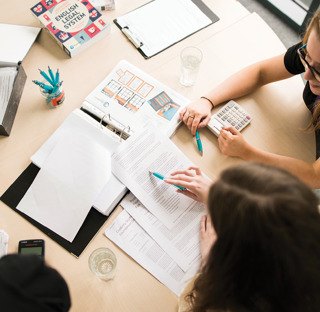Qualification levels are determined by the National Qualifications Framework (NQF), based on the knowledge and skills that you learn when you complete them. Levels start at ‘entry-level’ and are numbered from 1 to 8, with level 7 being the highest level qualification that we currently offer.
You can generally ‘move up’ levels by completing lower level qualifications but to understand specific entry requirements for courses you are interested in, make sure you read the entry requirements on our course webpages. For some courses, we will take life and work experience into account when considering applications so if this applies to you, make sure you get in touch to discuss your options.
Levels
Entry level
Courses designed for people with little or no experience or qualifications. They’re a great way to get develop skills and build your confidence.
Level 1
GCSE grades 3-1, Foundation Diplomas and National Vocational Qualifications (NVQs) Level 1
Level 2
GCSE grades 4-9, Level 2 Diplomas, Traineeships and Intermediate Apprenticeships
Level 3
A Levels, Apprenticeships, Vocational, T-Levels, Foundation Entry Degrees and Access to Higher Education Diplomas
T-Levels
Take your study to the next level with T-Levels in Construction, Digital, Health & Social Care, Early Years, Engineering and Business- with more courses to be added nationally in the future. T-Levels provide you with skills for life
A New Way to Study
T-Levels are a new vocational programme for 16-18 year olds created in partnership with employers and business to ensure that the content meets industry demands - ideal to study after completing your GCSEs. They are a two-year Level 3 study programme that will offer you a mixture of classroom-based learning and "on-the-job" experience.
A-Level Equivalent
T-Levels are equivalent to three A-Levels and are a two-year advanced qualification bringing classroom and work placement together. T-Levels have been developed in collaboration with employers and are built to the same standards as Apprenticeships. This qualification meets the needs of employers and business leaders whilst preparing you for your future career whether you head straight into your career, on to a higher level Apprenticeship or a degree.
Balance Between Classroom Learning and Work Placement
You will spend 80% of your study programme in the classroom and 20% in a 45-day work placement to equip you with the knowledge and skills employers are looking for. As part of your classroom based learning you will study relevant topics related to your subject in order to give you the core knowledge and skills needed to work in the sector. You will be assessed through a range of external exams, assessments and coursework.
During your industry placement you will develop the professional skills required for your chosen industry, as well as the personal, social and employability skills you need for the future. As part of this work placement, you will be assessed through an employer set project.
Take Your Study to the Next Level
T-Levels have been designed with leading businesses and employers to give you the knowledge and skills you need. More than 250 businesses – including major corporations such as Fujitsu, Skanska and more who have been involved so you can be confident your T-Level will move you to the next level.
Get Ahead in Your Career
T-Levels give you the chance to learn what a real career is like while you continue your studies. Your industry placement will last for at least 45 days. This will look great on your CV, impress in a University application and help prepare you for future full-time work.
Options Available at Blackburn College
T-Levels are well underway here at Blackburn College across Construction, Digital, Health and Social Care, Early Years, Engineering and Business - with more to be added nationally in the future. You can always ask about T-Levels when you meet our School Liaison Team. They will be happy to help. Alternatively, email sl@blackburn.ac.uk for more information.










